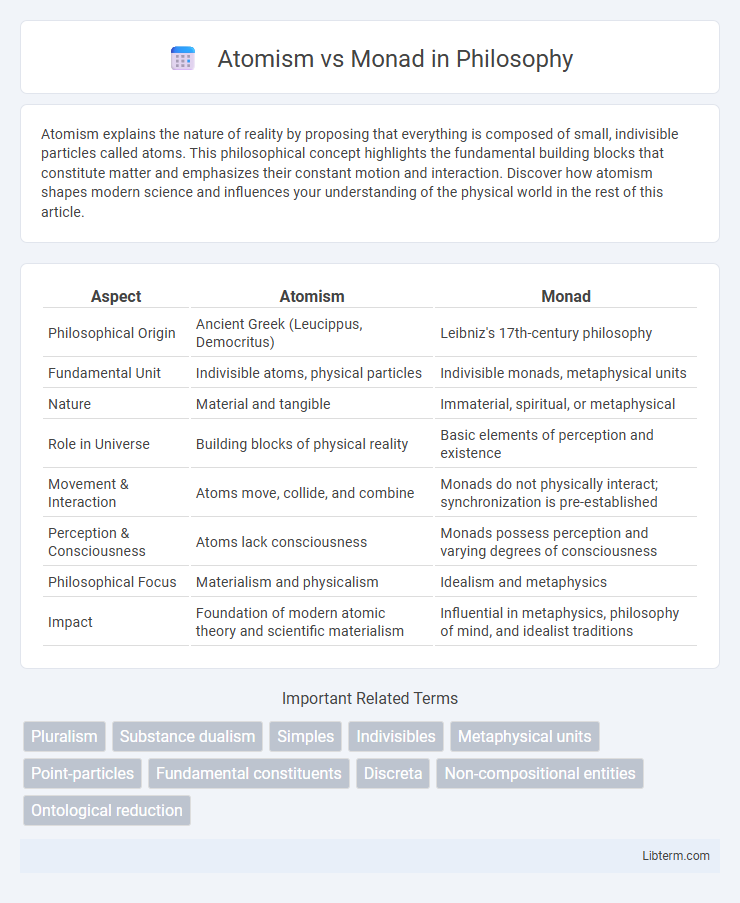Atomism explains the nature of reality by proposing that everything is composed of small, indivisible particles called atoms. This philosophical concept highlights the fundamental building blocks that constitute matter and emphasizes their constant motion and interaction. Discover how atomism shapes modern science and influences your understanding of the physical world in the rest of this article.
Table of Comparison
| Aspect | Atomism | Monad |
|---|---|---|
| Philosophical Origin | Ancient Greek (Leucippus, Democritus) | Leibniz's 17th-century philosophy |
| Fundamental Unit | Indivisible atoms, physical particles | Indivisible monads, metaphysical units |
| Nature | Material and tangible | Immaterial, spiritual, or metaphysical |
| Role in Universe | Building blocks of physical reality | Basic elements of perception and existence |
| Movement & Interaction | Atoms move, collide, and combine | Monads do not physically interact; synchronization is pre-established |
| Perception & Consciousness | Atoms lack consciousness | Monads possess perception and varying degrees of consciousness |
| Philosophical Focus | Materialism and physicalism | Idealism and metaphysics |
| Impact | Foundation of modern atomic theory and scientific materialism | Influential in metaphysics, philosophy of mind, and idealist traditions |
Introduction to Atomism and Monadology
Atomism posits that the universe is composed of indivisible, discrete particles called atoms, which combine in various ways to form all matter and phenomena, emphasizing physical substance and material interactions. Monadology, introduced by Gottfried Wilhelm Leibniz, describes reality as consisting of simple, immaterial, and indivisible units called monads, which are metaphysical points of force reflecting the entire universe from unique perspectives. Both concepts foundation distinct philosophical frameworks: atomism centers on tangible particles in space, while monadology focuses on metaphysical entities with intrinsic properties and internal harmony.
Historical Origins and Philosophical Roots
Atomism, rooted in ancient Greek philosophy with thinkers like Democritus and Leucippus, posits that the universe is composed of indivisible particles called atoms moving in a void. Monadism, developed by Leibniz in the 17th century, introduces monads as simple, indivisible, and immaterial units constituting reality, each reflecting the entire universe from its perspective. These philosophies diverge in their foundational assumptions: atomism emphasizes physical particles as the basis of matter, while monadism centers on metaphysical, non-material entities as the fundamental substances.
Key Figures: Democritus vs. Leibniz
Democritus, a pre-Socratic philosopher, developed Atomism, proposing that the universe consists of indivisible atoms moving in a void, which form the basis of all matter. In contrast, Gottfried Wilhelm Leibniz introduced the concept of Monads as fundamental, indivisible, and immaterial units of reality, each with unique internal properties and perceptions. The key difference lies in Democritus's focus on physical particles versus Leibniz's metaphysical points of force that shape existence through pre-established harmony.
Fundamental Concepts: Atoms vs. Monads
Atoms represent indivisible, material particles forming the physical universe, emphasizing tangible, discrete units of matter in classical atomism. Monads, in contrast, are immaterial, indivisible units of consciousness or metaphysical entities proposed by Leibniz, characterized by unique qualities and internal perceptions. Atomism centers on physical composition, while monadology focuses on metaphysical reality and subjective experience as fundamental building blocks.
Nature of Reality: Materialism vs. Idealism
Atomism posits that reality is fundamentally material, composed of indivisible particles called atoms that interact in a void, emphasizing a physicalist and deterministic universe. Monadology, introduced by Leibniz, asserts that reality consists of immaterial, indivisible units called monads, which are metaphysical and reflect an idealist perspective focusing on perception and pre-established harmony. These contrasting views highlight the materialism of atomism and the idealism of monadology in explaining the nature of existence.
Structure and Composition of the Universe
Atomism posits that the universe is composed of indivisible, solid particles called atoms that combine in various arrangements to form all matter, emphasizing a materialistic and quantitative structure. Monadism, introduced by Leibniz, describes the universe as made of simple, immaterial entities called monads, which are metaphysical points of force reflecting the entire cosmos in a qualitative and harmonious composition. Atomism focuses on physical composition and spatial arrangement, while Monadism centers on non-physical, dynamic units that constitute reality's fundamental structure.
Perception, Consciousness, and Individuality
Atomism posits that perception and consciousness arise from the arrangement and interaction of indivisible atoms, emphasizing a materialistic and mechanistic view of individuality as a composite of discrete elements. Monadism, particularly in Leibnizian philosophy, views monads as simple, immaterial substances with intrinsic perception and consciousness, where individuality is rooted in the unique, self-contained perspective of each monad. This framework highlights a fundamental difference: atomism reduces consciousness to physical parts, while monadism attributes an inherent, indivisible quality to subjective experience and individuality.
Scientific Influence and Legacy
Atomism, rooted in ancient Greek philosophy by Democritus, laid the groundwork for modern scientific theories by proposing that matter consists of indivisible particles called atoms, directly influencing the development of atomic theory in physics and chemistry. Monadism, introduced by Leibniz, emphasizes metaphysical units called monads as fundamental, indivisible entities of reality, shaping philosophical discussions on perception and consciousness rather than empirical science. Atomism's legacy endures in empirical research and quantum mechanics, while monadism contributes predominantly to metaphysical frameworks within the philosophy of science.
Criticisms and Debates
Atomism faces criticism for oversimplifying reality into indivisible particles, neglecting the complexity of underlying forces and interactions at quantum levels. Monad theory, proposed by Leibniz, is debated for its abstract metaphysical nature, lacking empirical evidence and making it difficult to reconcile with physical science. Scholars argue that both models struggle to adequately explain consciousness and the dynamic unity of existence, fueling ongoing philosophical and scientific discussions.
Modern Relevance and Philosophical Impact
Atomism, foundational to modern science, underpins contemporary physics by conceptualizing matter as discrete, indivisible units, influencing quantum theory and material science. Monadology, introduced by Leibniz, provides a metaphysical framework emphasizing indivisible, self-contained entities or monads, impacting discussions in consciousness and philosophy of mind. The ongoing relevance of both doctrines lies in their contribution to debates on the nature of reality, bridging empirical investigation and metaphysical inquiry.
Atomism Infographic

 libterm.com
libterm.com